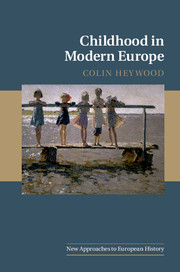Book contents
- Childhood in Modern Europe
- New Approaches to European History
- Childhood in Modern Europe
- Copyright page
- Contents
- Figures
- Acknowledgements
- Introduction
- Part I Childhood in Villages, Eighteenth and Nineteenth Centuries
- Part II Childhood in Towns, c. 1700–1870
- 4 Enlightenment and Romanticism
- 5 Middle- and Upper-Class Childhoods in Towns, c. 1700–1870
- 6 The ‘Lower Depths’
- 7 Work versus School during the Industrial Revolution
- Part III Childhood in an Industrial and Urban Society, c. 1870–2000
- Conclusion
- Select Bibliography
- Index
4 - Enlightenment and Romanticism
from Part II - Childhood in Towns, c. 1700–1870
Published online by Cambridge University Press: 31 August 2018
- Childhood in Modern Europe
- New Approaches to European History
- Childhood in Modern Europe
- Copyright page
- Contents
- Figures
- Acknowledgements
- Introduction
- Part I Childhood in Villages, Eighteenth and Nineteenth Centuries
- Part II Childhood in Towns, c. 1700–1870
- 4 Enlightenment and Romanticism
- 5 Middle- and Upper-Class Childhoods in Towns, c. 1700–1870
- 6 The ‘Lower Depths’
- 7 Work versus School during the Industrial Revolution
- Part III Childhood in an Industrial and Urban Society, c. 1870–2000
- Conclusion
- Select Bibliography
- Index
Summary
- Type
- Chapter
- Information
- Childhood in Modern Europe , pp. 81 - 96Publisher: Cambridge University PressPrint publication year: 2018

